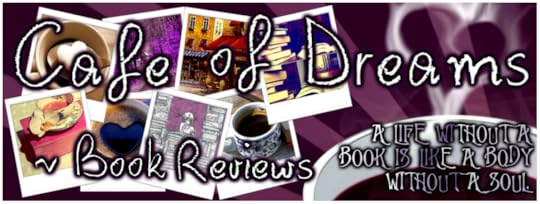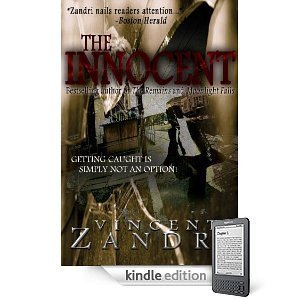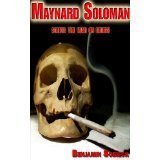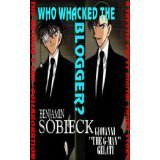Benjamin Sobieck's Blog, page 54
June 21, 2011
The Next Maynard Soloman Adventure
Coming soon to the crime fiction humor section...
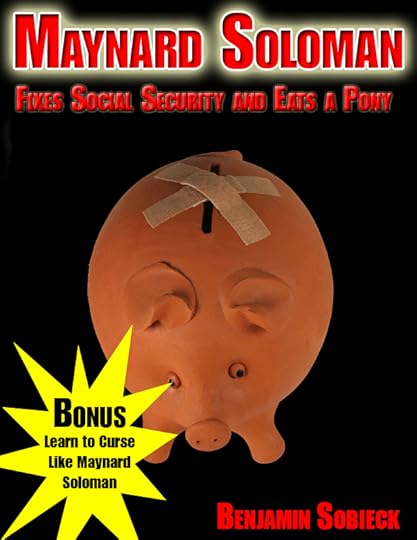
June 20, 2011
Fun at the Cafe of Dreams
One of the cool things about being an author is that people sometimes request to interview you. They also ask you to take your shoes off before installing the cable.
One of the cool interview/book review people out there is April over at Cafe of Dreams. She reads a ton, posts interesting reviews and is known to spotlight wannabes like me. I especially like her slogan: "Life without a book is like a body without a soul."
True, no?
Luck was on my side the day she asked to interview me. I had a ton of fun. That six-pack of Trestle Press stories she mentions will be out soon, too.
June 17, 2011
The Little Publishing House That Could
Months ago, few people had heard of the little publishing house called Trestle Press. It didn't even have a website. It still doesn't.
But what it does have is an army of authors and readers devoted to creating and experiencing excellent books. In the last few months, Trestle Press is burning up the charts. It's morphed into a hot house with stellar talent. Readers have clued in to this in a big way. Trestle Press titles and authors make regular appearances in Amazon Top 10 lists in many categories.
I'm humbled to have contributed in some small way to this. Trestle Press published "Cleansing Eden" and a number of short stories. The house combines everything good about indie e-book publishing: passionate people in it for the love of what they do.
That said, here's a post from prolific literary blogger Giovanni Gelati, a short story collaborator who also designs the covers for Trestle Press.
(P.S. You can get direct links to all of the e-books mentioned here by clicking here.)
---
Waking to the news that one of my fellow collaborators, Big Daddy Abel, had three titles in the TOP TEN in his category made me take pause and reflect a bit. My wife made me stop though as it appeared it I may go into a seizure or something. Pausing and reflecting is not one of my many strong points. Here is the thing: as little as four months ago BDA was not doing this, the writing thing, nor was Trestle Press doing publishing on any type of major scale. Since then though, the talent they have been able to assemble has been nothing short of amazing.
Big Daddy Abel, Joanne Lewis & Amy Faircloth, B.R. Stateham, Laurie Bowler, H.R. and Cody Toye… the list keeps going. What have they accomplished?
-Laurie Bowler has had not just one, but eight different titles in the running on Goodreads for YA stories of the year, both full length and short story. At one point in the poll she had all eight in the top ten. Not Bad! If you are a Vampire lover and have yet discovered her, check her out!
-Joanne Lewis and Amy Faircloth have had "Wicked Good" going at a steady pace receiving not just incredible reviews but amazing praise for their novel that involves the depiction of a single mother raising her son who has Autistim/Aspergers.
-Big Daddy Abel has made a quantum leap from where he started oh those many days and months ago. Wait, it is just since the end of February. Here is the thing about my fellow collaborator, he is just everything that you see. There is nothing sugar coated about him; he is the real caring, deal. That is just part of the reason he and his work have become so beloved in such a short period of time. He will be adding to his library very soon with Volumes Four and Five of the Open Mic series and we have a new The Author's Lab/Collaboration coming out called "The Edge of Cataclysmic" ; it is global warming smack in the face kind of thing.
-The Author's Lab/Collaboration series- by the end of next week there will be Ten, yes I just wrote Ten, titles in that franchise. The experiment thus far has yielded results that I don't think anyone could have envisioned when we started doing this. Writer's block has been cured; new characters for authors have been born, and authors have been doing things they haven't thought possible. This is part and parcel of what Trestle Press is all about: the AUTHORS and the READERS. Both win in this exchange; there are no losers.
To wrap this up, I have not mentioned all the authors that are under the Trestle Press umbrella right now. There are a number of them and they cover just about every genre at this time.
In my opinion, they are quality individuals that have a singular purpose: to bring to you the best written material they possibly can. They care about you the reader! They not only want you to read their hard, heartfelt work but they want to hear from you about it. What did you think about it? How can they improve as an author? I would say that they probably have a hundred other questions to go along with this, but at bare minimum they want you to take their measure, to see their heart, soul, passion and drive for what they love to do, what they feel deep down in the essence of their being that they were born to do. To sum it up though, if you are looking for a quality read from an "Indie Publisher" that is not only willing to take chances but wants to in order to bring you the best day in and day out, why not put their name, Trestle Press, in the toolbar at Amazon, Barnes & Noble or Smashwords and download one of the many titles; the authors are waiting to hear from you.
Here is a listing of authors currently hard at work for you, trying to win you over as a reader at Trestle Press: Alexandrea Weis, Amy Faircloth, Angelique LaFontaine, Barbara Briggs Ward, Benjamin Sobieck, Big Daddy Abel, Blaise Valentine, B.R. Stateham,Chantal Boudreau, Cleveland W. Gibson, Cody Toye, CQ Scafidi, Ed & Eunice Vought, Edgar Strathmore, Ellyn Laub, Floyd Buck Periwinkle, H.R. Toye, J. Evan Johnson, James DuBois, Jeffrey Martin Jr., Joanne Lewis, John Reed, Joy Spraycar, Laurie Bowler, R.W. Doyen, Robert Ford, Samantha Weiler, Skylyr Symkyns, S.R. Edvalson, Thad Brown, Tom Sumner, Thomas White, Thierry Thelemaque, U.R. Mine and Werner Lind.
(P.S. You can get direct links to all of the works mentioned here by clicking here.)
Review: The Innocent by Vincent Zandri
Book three in my Vincent Zandri marathon was "The Innocent." It kicks off the Keeper Marconi series, which follows a prison warden's career change to kicking ass outside the iron house, not in it.
"The Innocent" once again finds Keeper set up. This time, he takes the fall for a prisoner who escaped during a dental appointment. He's got to find the prisoner and figure out how to clear his name.
Actually, "this time" would be inaccurate, as I read "The Innocent" before I read its sequel, "Godchild," where he is also set up. No bother, it's all good stuff.
"The Innocent" starts what "Godchild" finishes, namely who murdered his wife. It's the motivating force behind everything he does. If Keeper has some contempt for humanity, it's only because he hasn't yet figured out which one of you dirty apes killed the love of his life.
The noir themes are heavy throughout "The Innocent," but didn't come across nearly as cliche as they did in "Godchild." It's my only criticism of this series. But as I've written before, there's a difference between regurgitating old tropes and just damn good writing. Zandri has that "it" factor that makes his work tick. There's a rhythm to his writing that works really well. I can't say that about everyone writing hard-boiled crime fiction these days.
Outside of noir, the other theme running through this series is redemption. Keeper's guilt for losing his wife drives him mad. He's lost his edge. After his death, the other characters note how absent-minded he's become. Even his crackdown on prison drugs, which used to be a roaring success, isn't working out. He's feeling weak and he knows it.
That's why he's so determined to clear his name and return to his job as a warden. His job is all he's got any more. Not that it's a rosy one. The book flashes back to a brutal Attica prison revolt in 1971. The event hardened Keeper's soul, but in the wrong ways. He knows disconnecting from the world is easy, but it's not worth the consequences. Because you might end up an alcoholic, like his friend Mike, or a sexual tyrant, like his boss, Wash Pelton. Or you might find yourself accused of a crime you didn't commit.
In short, Keeper is a complicated guy. I couldn't appreciate that by reading "Godchild" alone. Maybe reading a series out of order isn't all it's cracked up to be.
Click here to get "The Innocent" from Amazon for the Kindle.
Click here to get "The Innocent" from Barnes & Noble for the Nook.
June 16, 2011
Listen to Podcast: Hangin' With the G-Man
Giovanni Gelati invited me back to his podcast show, The G-Zone, today. That's a pleasant surprise, since we had a major disagreement about fruit pizza the last time I called in to the show. But time heals all wounds. It helps that fellow Trestle Press crime author S.R. Edvalson primed the waters beforehand.
I'm kidding, people, relax. Giovanni and I only take stabs at each other in bocce ball tournaments. And we haven't even had one. I've yet to get close enough to even slip a blade into his armpit during a jack throw. Considering he lives on the East Coast and I drive a '99 Civic, that meeting is unlikely anyway.
If you're so inclined to listen to the podcast, you can do so here. I call in about halfway through. The three of us had a helluva time talking about e-books and e-readers.
June 14, 2011
Can Typos Ruin a Non-Fiction Book?
How much does a typo matter to you?
 If it's in fiction - and the writing is otherwise top notch - my response is, "Who cares?"
If it's in fiction - and the writing is otherwise top notch - my response is, "Who cares?"
But what if it's non-fiction? Does it change how you view the information?
That was the boondoggle "Stupid History," by Leeland Gregory, presented. I downloaded it to my Nook as part of a Free Friday promotion from Barnes & Noble.
I don't want to be a jerk and say something like, "I'm glad it was free." But I definitely don't want to pay for editing this bad. For all I know, it wasn't the author's fault. He probably burned himself out on research and passed the editing to a third party, who did a shoddy job.
I don't know that's the case. I do know one thing: The historical trivia was entertaining to read. The quick entries about, well, stupid history trivia make essential reading for a Walking Encyclopedia of Worthless Information like me. Or if you hang your e-reader next to your toilet paper - unlike me.
However, the information may be rendered extra worthless if it's not accurate. The numerous typos throughout "Stupid History" force me to consider this. Much of the trivia I'd heard before, and I knew was accurate. As for the rest, that's up to you, dear reader.
Be careful with this one. You might end up learning some "stupid history" yourself.
Click here to get "Stupid History" for the Kindle.
Click here to get "Stupid History" for the Nook.
What about you? Do typos ruin non-fiction works?
June 11, 2011
Anthology Helps Japan Relief Efforts
What happens when a pile of terrific crime authors get together with the mission of supporting the ongoing relief efforts in Japan?
You get one awesome anthology for a great cause, "Shaken: Stories for Japan." One of my fellow CrimeSpace members and author of Japanese historical fiction, I.J. Parker, had this to say about the anthology:
"This collection of short stories from twenty writers (no fewer thant en are members of CrimeSpace) is the brainchild of our own Tim Hallinan. He has worked on this project for several months now, as our contribution to the Japan disaster relief. The book contains mysteries, articles, and Basho's haikus and is an altogether lovely thing.
"The book is available for the Kindle (and can be downloaded to be read on PC with Kindle software). It is already, in just a few days, bringing in fantastic sales. The last tiime I looked, it was number 20 for Kindle books, and number 13 for short stories.
"The price is a mere $3.99 and all the profits go to the Japan Relief Fund. Go and sample! And do a kind thing!"
Right-o, I.J. This is a fantastic idea.
Click here to get "Shaken" at Amazon.
P.S. It's not available for the Nook yet. I left I.J. a note requesting they put it up there, too. Being a Nookie myself, I'd jump on this.
June 10, 2011
As Seen on the Vincent Zandri Vox: 11 Reasons to Enjoy Maynard Soloman
Imagine my surprise when my crime author hero, Vincent Zandri, caught wind of a guest blog post about Maynard Soloman I wrote for Giovanni Gelati and posted it here on his blog. Imagine how quickly I had to change pants when I reminded myself he sold 100,000 ebooks of his kick ass crime novels in the last 60 days. Or don't. That's gross.
It's a huge honor. He said some really nice things about Maynard Soloman. I think he's right on the money about coming up with new ways to thread the PI yarn.
Without further ado, here are 11 reasons to enjoy Maynard Soloman...as seen on the Vincent Zandri Vox.
* * *
11 Reasons to Enjoy Maynard Soloman
by Benjamin Sobieck
Now before you roll your eyes and say, "Another serialized PI? Puh-leez," I want to tell you why Maynard Soloman is different. I, too, had read a million incarnations of Sam Spade. Maynard Soloman might've worn a fedora, but that's where the similarities end.
Here are 11 reasons Maynard Soloman is worth a look.
1) He was forced into retirement from his career as an investigator for the Obscenities Division of a local police force. He got stiffed on some medical bills, so he has to keep working. Which is why he...
2) Bought a Winnebago. Not only can he see the country (a staple of any retiree's dreams), he uses it as a...
3) Mobile office. He bought a police scanner and spray painted the words "Maynard Soloman Investigation Services" on the side. He's not too worried about the 'bago looking junky because...
4) The Winnebago takes a beating in every story. In "Who Whacked the Blogger?" he had to outrun a competitor when chasing an ambulance containing a potential client. In "Maynard Soloman Solves the War on Drugs," some punks break windows and spray paint graffiti on the side panels. That had Maynard...
5) Cursing in his own special way. A typical Maynard line would be, "Some punk-ass fruit bats spray painted the 'bago with a gal-damn penis." He's got a potty mouth rooted in a mix of early 20th Century cuss words and his own inventions. "Fruit bat" is someone who is both fruity and bat-shit insane. He also invented...
6) The 'nard Bag. As he can't afford an extra large sleeping bag, he invented the 'nard Bag. Simply pick out a pair of the largest sweatpants you can find. Cut the legs and sew them together so there is only one leg. Says Maynard, "It's pure mollycoddling." He enjoys stretching out, especially when...
7) He has health problems. It's an overarching theme across the stories. It's not clear yet what they are, but Maynard knows he can't outrun time. Speaking of time...
8 ) Maynard is clueless about technology. It's always baffled him. In "Who Whacked the Blogger?" his client runs a blog. Maynard spends most of the time trying to figure out what that means. He's also behind on...
9) Crime trends. In "Maynard Soloman Solves the War on Drugs," he is solicited by a teen to buy some cold medicine for him. Maynard becomes suspicious when he hears the medicine must contain pseudoephedrine. "Sounds like a fake drug to me. Are you trying to play a prank on me?" Maynard says. Of course, readers know pseudoephedrine is kept behind the counter because it's used to make meth. But the clueless Maynard Soloman thinks he...
10) Knows everything. He's absolutely convinced the world is much stupider than he. It's the big dumb world's fault he can't walk up to a drive-through and place an order. He can see the obvious answers when no one else can. That's why he can be so bold as to proclaim he's solved the War on Drugs in, "Maynard Soloman Solves the War on Drugs." But he's not so bold as to...
11) Use weapons of any kind. He was denied a concealed carry permit, probably related to the messy forced retirement situation. But he says the real reason is, "I cross too many state lines in the 'bago. Don't want one of my old police buddies to throw me in the slammer."
I hope you'll check out Maynard Soloman. I had a ton of fun writing him. More adventures are on their way. In the meantime, check out "Who Whacked the Blogger?" and "Maynard Soloman Solves the War on Drugs."
My Battles With Facebook Ads
Thisseems to be not isolated to my experience, since there are scores ofthreads online about how facebook is mismanaging its ad system. Onceyou open an ad account, it requires you to enter a billing method.However, I cannot close my ad account or remove that billing method.I've tried a million ways. I can't.
Seems scammy.
They also billed one of my advertising campaigns to my credit cardwhen they should've done it to a coupon they e-mailed me. I sent noless than six letters through their help system (suspiciously, they donot offer a customer service phone number), and resolved nothing beyondan automated "We'll look into it" message.
Lots of authors consider facebook. My advice: Don't waste your time. I'm not an idiot when it comes to the Web. Facebook Ads has to be one of the worst experiences I've had with any online service.
June 7, 2011
Guest Post: How Do Authors Create Their Voice?
Today's guest post is from Chantal Boudreau, who is a double threat as both an artist AND author. I've always admired people who can create visual art, because I sure as hell can't. One thing we both can do is find voice in an author's writing. It's a bit hard to describe, but I think most readers know what it means. How is this voice created? She answers that question in this interesting post.
-Ben
---
Choosing what voice you are going to use is an important part of the planning process in fiction writing. Normally, I hate writing in first person. I don't think I'm very good at it, and I don't think that I necessarily do the narrator proper justice, but sometimes the stories demand it, so I grit my teeth and go. I have a much easier time approaching a tale as observer. I've heard several writing peers suggest that writing for them is a matter of recording the movie going on in their head, and it is a similar experience for me. When writing in first person you are no longer observing but have to immerse yourself into the character completely, and I don't like trying to present a story from inside of someone else's skin.
When voice does give me trouble, aside from the narrative, part of the problem is language. I can usually (although not always – I've had my dismal failures) capture the nature of the characters in the dialogue. My novel, Fervor, was a test of skill, because the characters were very unusual children and it takes some careful explaining as to why an 8-year old speaks like a Pulitzer prize-winning journalist, but the 13-year-olds he's with sound more like (although not exactly like) typical teens. In most cases, though, it's just a matter of making sure their personality shows through their word selection.
Accents can be difficult to master too, and sometimes I skip trying to reflect the accent in the dialogue and just note it in the description, like with my wandering barbarian, Traveller. As one of my test readers pointed out though, it's best to try and find a way in tone or expression to really distinguish your characters in a story, so that there's never any question as to who is speaking if you have no dialogue tags (my dialogue tags are an overused guilty pleasure, but it is not a habit I'm willing to discard.)
Returning to first person narrative – the hard part for me is not just the perspective, or capturing the voice, but the fact that the voice is coming from inside the character's head. You actually have to think like that character. That might come easily to some writers, but my brain fights the idea of regressing to the mind-set of a precocious 7-year-old child trapped in a very traumatic situation, like in my short story, "Little Sister," or even worse, a particularly repulsive, villainous character who is bemoaning a well-deserved, but pretty horrific fate, like in my Arabian moralistic fable, "Dry Heat." It is a struggle to go against your better nature when it wants you to keep a character like that at arm's length, and in a way, it comes as no surprise to me that such a story elicited very mixed responses from my test readers, some glowingly positive and others filled with revulsion. Seeing things from that character's point of view can be horribly unsettling.
There is also the second person option, an obscure form commonly used in select-an-ending YA tales, but I haven't dabbled in that narrative style yet. I'm not one to shy from challenge, but I think my stories will remain, for the most part, third person. That still leaves me with whether I want the story to be directed – from a single character perspective using the third person narrative – or omniscient which allows for a broader point of view. Once again, it really depends on what the story demands. In Fervor, my digital short story, "The Ghost in the Mirror," and in my current work-in-progress, When You Whisper, the story really is from one character's perspective, just not from inside their head, so third person directed was fitting. The majority of my novels, however, cover varying scenes with multiple characters and don't just follow one protagonist in particular. With these ensemble tales, third person omniscient seems to be more appropriate.
I'm sure there are those who disagree with my approach (especially my use of dialogue tags,) but as an artist, I have to present things in a way that leaves me satisfied with the results, and that I would enjoy if I were the reader and not the writer. It's good to have knowledge of technique and style, but maintain that awareness that the voice you choose should match your vision and should not adhere to someone else's absolutes.

